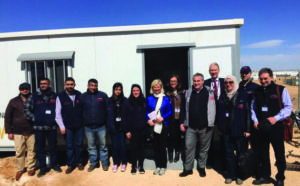News
News in Digest: Good cop, bad cop take Kabul by the horns
This article is more than 7 years old.
Ulla Tørnæs, the minister for development, is a sight for sore eyes in most of the world’s trouble-spots … providing she’s travelling alone

“Is she alone … Great! Get the cheque book out!” (photo: Foreign Ministry)
Ulla Tørnæs, the minister for development, is quietly ‘developing’ (geddit?) a reputation for being a bearer of good news, and the last three weeks have been no different, with Syria, the Rohingyas, African wind energy and women in need of contraception during humanitarian crises all benefiting from the swish of her pen.
But put Inger Støjberg, the minister for immigration and integration, on the same plane and suddenly you have a good cop, bad cop scenario.
Clear expectations
The double act recently visited Afghanistan and met with President Mohammad Ashraf Ghani. On average, Denmark has annually given Afghanistan 425 million kroner this century, and Tørnæs hailed its “prospects”. Cue bad cop!
The discussion duly touched on the country receiving rejected Afghan asylum-seekers and how Denmark can help the country with reception and reintegration programs.
“The government’s policy is that when we support a developing country, we have a clear expectation the country will co-operate in returning its own nationals if they have been denied asylum or have been expelled from Denmark,” said Støjberg.
Recce to Sicily
Støjberg was no doubt keen to learn the findings of Tørnæs’s early May recce to the Mineo centre on Sicily, one of the biggest recipients of refugees and migrants crossing the central Mediterranean Sea.
Tørnæs discussed preventative measures with representatives of the UNHCR, as well as speaking with migrants to gain insight into some of the reasons why they embark upon the perilous journey from Africa.
Contraception interceptions
It is mainly in Africa, particularly in the countries experiencing humanitarian crises, where the government is helping to promote women’s access to contraception.
It has accordingly donated 60 million kroner to the UN food program WFP as it is a great platform through which to meet African women who might need help.
“Usually, it is the women who are dispatched to collect the food WFP distributes, and when they receive the food products it’s sensible to provide them with information about sexual health,” explained Tørnæs.
A generous month
However, Africa didn’t get Tørnæs’s biggest cheque of the past month. Some 730 million kroner has been earmarked to help alleviate the ongoing crisis in Syria.
Half the sum will be dedicated to focusing on a sustainable development among refugees and local communities in Lebanon and Jordan.
A further 105 million kroner has been donated to ease the plight of the 671,000 stateless Rohingyas currently residing in overcrowded camps in Bangladesh after fleeing from Myanmar last year, taking the total Denmark has given so far to 286 million kroner.
And the government has committed 600 million kroner to building a 100 MW wind farm close to Ethiopia’s capital Addis Ababa. In total, the project will cost 1.26 billion kroner.










































